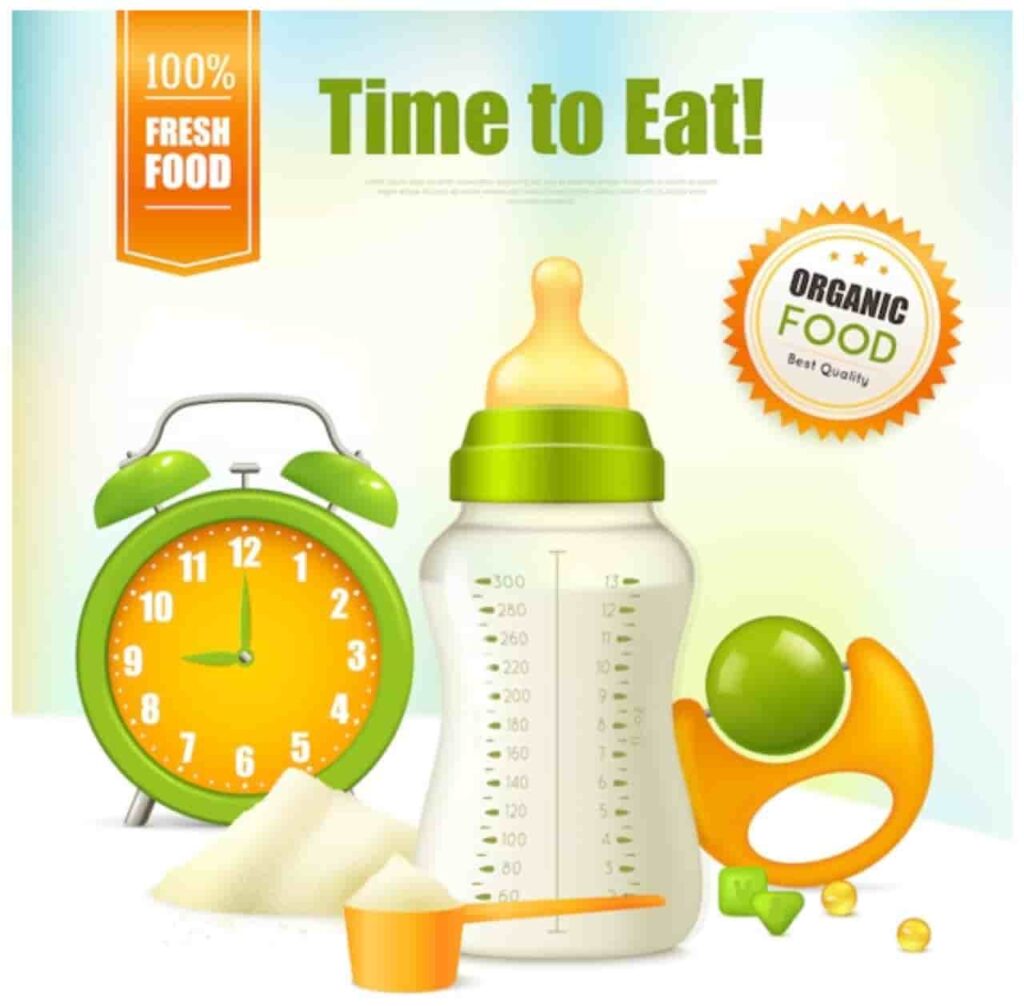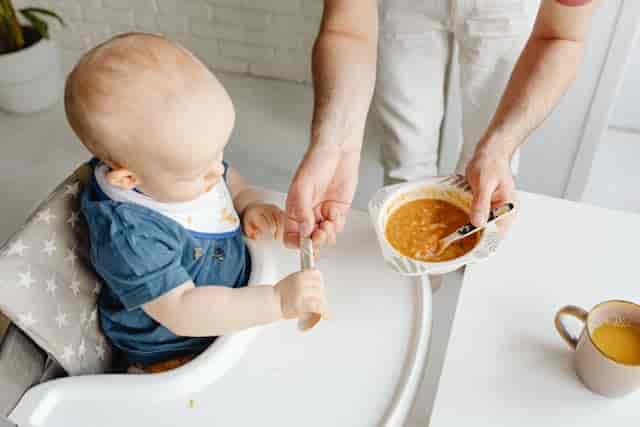Are you a caregiver, a new parent, or any other person trying to find the healthiest foods for your baby? Organic baby food could be the solution you’re looking for.
As people become more aware of leading healthier lives, more parents are choosing to feed their children organic food. This post will discuss the advantages of organic baby food and the reasons it’s an ideal choice for your child’s health.
What is Organic Baby Food?
Organic baby food is produced using inputs that are farmed without the use of artificial fertilizers, genetically modified organisms (GMOs), or pesticides.
Furthermore, it doesn’t include any artificial flavors, preservatives, or colors. The organic certification guarantees that the food satisfies stringent requirements established by regulatory entities.
By going for organic food, you can give your infant a diet high in nutrients and devoid of potentially dangerous chemicals present in conventionally grown food products.
Organic farming methods give precedence to the use of compost-based fertilizers, biological pest management, and crop rotation. This method creates a more ecologically friendly and sustainable food production system by enhancing biodiversity and soil health.
The foods are specially prepared to satisfy their specific nutritional requirements, making sure babies get the best foundation in life.
Organic vs conventional/non-organic baby food
The major difference between conventional/non-organic and organic baby food is the manner in which the food ingredients are processed or grown. Non-organic baby food often contains ingredients that have been subjected to synthetic fertilizers, GMOs, and pesticides.
These additives and chemicals can have adverse effects on the health of your baby.
In contrast, organic baby foods are grown or produced using ecologically friendly practices. Organic farmers adhere to stringent regulations to guarantee that their products are devoid of hazardous chemicals and genetically modified organisms.
Besides, organic baby food is better for your child because it doesn’t contain artificial flavors, preservatives, or colors.
Benefits of choosing organic baby food
Nutritional advantages of organic baby food
Research has demonstrated that organic foods contain increased quantities of essential nutrients, including antioxidants and vitamins, when compared to their non-organic counterparts.
Organic vegetables and fruits are produced in soils rich in nutrients and are let to ripen fully before they are harvested. As a result, the produce is more nutrient-dense and tastes better.
By opting for organic, you can offer your infant a diet high in minerals, vitamins, and antioxidants that are essential for both their development and growth.
Again, the food is meticulously prepared to preserve the highest nutritional content of the food components, guaranteeing that your baby gets all the vital nutrients they require.
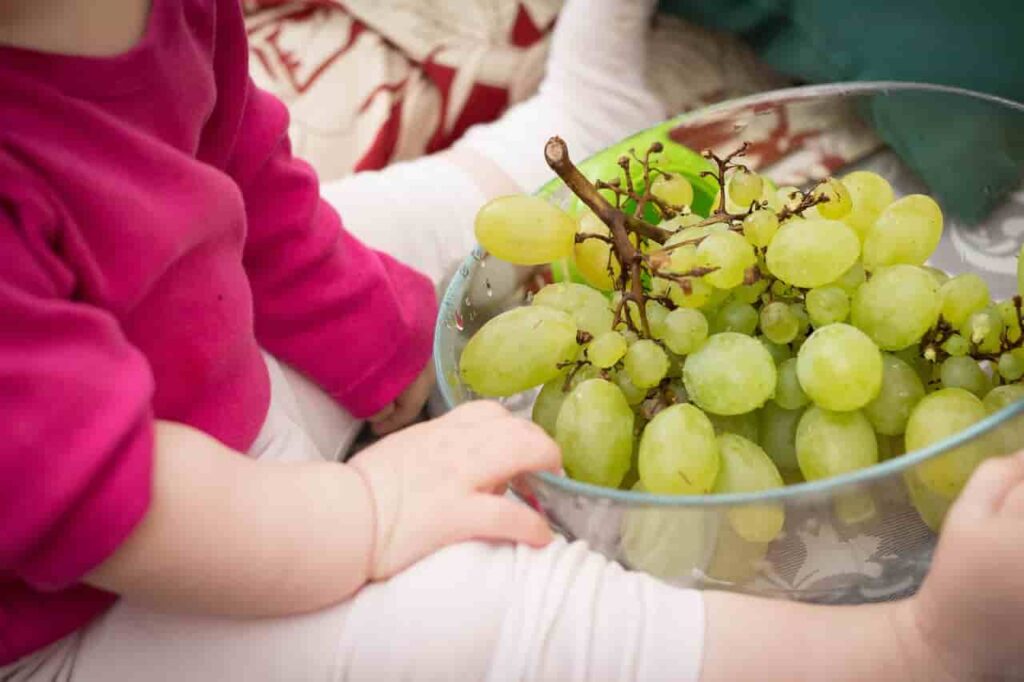
Organic baby food is more nutritious
Less exposure to toxic pesticides and chemicals
One of the main reasons parents opt for organic baby food is to limit or minimize their infant’s exposure to toxic pesticides and chemicals (1). Conventional farming methods usually involve the application of synthetic fertilizers and pesticides, which may deposit residues on the yield.
These residues may be harmful to the health of your baby, particularly considering their developing immune system and smaller body size.
These foods are produced with ingredients that have been cultivated without the application of artificial fertilizers or pesticides. This significantly lowers your baby’s exposure to toxins that could be hazardous.
Choosing organic food allows you to feed your baby without worrying about chemicals or pesticides, giving you peace of mind.
Avoidance of antibiotics and hormones
Organic animal products, for instance, dairy and meat, are produced from animals that were not given antibiotics or growth hormones throughout their upbringing. By doing this, you lessen the possibility of exposing your child to unwanted antibiotics and hormone residues.
Reduced risk of sensitivities and allergies
Research indicates that, in comparison to conventional diets, organic foods may have fewer allergenic proteins. Choosing organic products could help lower the chance of negative reactions for infants with sensitivities or allergies.
Traceability and transparency
The foods are always subjected to rigorous certification requirements, guaranteeing traceability and transparency throughout the manufacturing process. This gives caregivers and parents a sense of comfort in understanding the origins and production process of their infant’s food.
Possible long-term health benefits
Although further study is required, some studies indicate that eating organic food may reduce your chance of developing certain illnesses like obesity, certain cancer types, and allergies. Thus, opting for organic food may improve your child’s health and well-being in the long run.
Better flavor and taste
A number of parents and caregivers believe that organic foods have a more flavorful and natural taste as compared to their conventional counterparts. This can support the development of your baby’s palate and promote good eating practices from a young age.
Support sustainable farming
Buying organic food helps to support farmers who use ethical and sustainable farming methods. This supports the development of a future food system that is more robust and ecologically conscious.
Tips for choosing the best organic baby food
There are a few factors to take into account while selecting organic food to make sure you are giving your child the best option possible. The following tips will help you choose the best organic baby food:
Check the label for organic food certification
Verify if the baby food you select has an organic certification. Examine for labels that state that an accredited organic certifying agency has certified the food item.
Examine the list of ingredients
Take note of the contents list and steer clear of baby food that has artificial coloring, flavoring, or preservatives. Choose items made using organic ingredients and have an easy-to-read ingredient list.
Take into consideration your baby’s age and developmental stage
Various baby food items are designed for specific developmental stages and age groups. Choose items that are appropriate for your baby’s stage of development to guarantee that your child gets the right nutrients.
Diversity and variety
Expose your baby to a range of textures and flavors by introducing them to a variety and diversity of foods. This will encourage wholesome eating practices and aid in the development of a diversified palette in your child.
Think of homemade alternatives
If you’re in the mood and have the means, think about preparing the food yourself. In this manner, you can guarantee that the meal is wholesome and fresh and that you have total control over the food components.
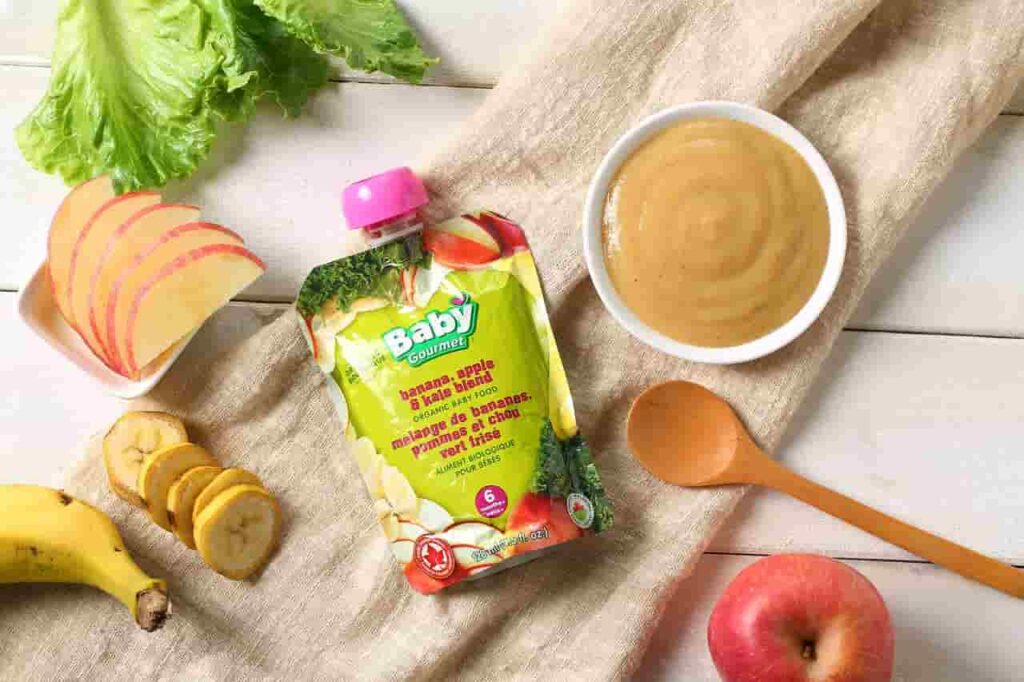
Organic baby food
DIY organic baby food recipes
Preparing your own baby food is a wonderful way to guarantee that your child is receiving the healthiest, freshest meals possible. Try these easy-to-make, homemade organic baby food recipes:
Avocado puree
You can prepare an avocado puree by mashing a ripe avocado with a fork until it’s smooth. Add a little amount of breast milk or baby formula to get the right consistency.
Pear and apple puree
Peel and slice a pear and an apple. Slice them thinly, then steam them until they become tender. Blend them until it becomes smooth, using water or breast milk as necessary.
Sweet potato mash
Bake or steam a sweet potato until it is tender. Mash it using a fork or you can blend it until it becomes smooth. Should it be necessary, thin it out with breast milk or a little water.
Broccoli and carrot mash
Steam broccoli and carrots until they are soft. Blend or mash them until they’re smooth. Add a small amount of formula or breast milk to modify its consistency.
Always remember to wash and peel the food items before starting your preparation to remove any germs that may be present. Make sure that you gradually introduce new food items and keep an eye out for any indications of sensitivity or allergy.
Common misconceptions about organic baby food
Despite all of the benefits, there remain a few widespread myths about organic baby food. Let us disprove a couple of them:
Organic baby food is too expensive
Although the foods may come with a modest price premium over conventional alternatives, the long-term health advantages make the difference worth it. Again, preparing your own baby food at home might also be a more affordable option.
Organic baby food doesn’t taste as good
They are produced from ingredients of the highest quality and are meticulously prepared to preserve their natural flavors. Several parents discover that their infants prefer the flavor of organic food over non-organic varieties.
Organic baby foods are not readily available
These foods have gained popularity in recent times, and most grocery shops and online retailers now provide a large selection of baby food options.
Organic Baby Food Storage Tips
As a caring parent, all you want for your child is the best. That is why you made the decision to switch to organic baby food to give them the healthful nourishment their developing bodies require.
However, have you ever considered the best way to keep your baby food fresh and nutrient-rich? Well, you should not look any further since I have provided you with some professional tips to ensure that your baby’s food is kept as nutrient-packed and fresh as possible.
How to Choose and Store Organic Baby Food
When selecting and storing baby foods, there are a few vital factors to take into account. To start with, make sure the product is fresh by always looking at the date of expiration printed on the container. Also, opt for baby food that is packaged without BPA (Bisphenol-A) to reduce contact with potentially toxic chemicals.
After buying the food, it is critical to store it correctly to preserve its nutritional value and freshness. Keep sealed pouches and jars out of direct sunlight in a cool and dry place. Once opened, you should keep the leftovers in a refrigerator and make use of them within a couple of days to prevent spoilage.
Preserving nutrients and freshness in organic baby food
Preserving the nutrients and freshness of the food is vital to guaranteeing that your baby receives the most benefit from their food. Following are some professional pointers to assist you in doing so:
Freezing Organic Baby Food
Freezing is a great technique to keep food fresher for longer without sacrificing its quality. It’s crucial to use freezer bags or airtight containers when freezing food to avoid freezer burn.
Split the food into smaller portions prior to freezing to make it easy to thaw just what you need. Mark the date and contents on every container to maintain track of storage dates.
Use glass jars for organic baby food storage
Glass jars are a common option for storing food because of their non-toxic and durable properties. Make sure the glass jars you use have airtight lids and are made particularly for freezing. Additionally, glass jars enable you to observe the contents distinctly, which makes it simpler to choose the best food for your child.
Proper organizing and labeling of organic baby food
Labeling and sorting your organic baby food is crucial to keeping your storage system neat. Consider waterproof markers and labels to make the content and date of every container clear.
Sort the containers in a methodical order, putting the oldest ones up front for convenience of reach. This will assist you in monitoring the freshness of every meal and preventing waste.
Avoid cross-contamination in organic baby food storage
Cross-contamination may happen if you are not cautious when storing your baby food. Use clean containers and utensils whenever handling food to avoid this.
Food deterioration and other health hazards might result from combining various kinds of food in a single container. Moreover, wash your hands well before making or presenting food to your baby, as a sign of good cleanliness.
Reheating and serving organic baby food
It’s crucial to adhere to the recommended procedures while reheating the food to guarantee food safety. Use your microwave’s defrost feature or leave frozen food in the fridge for the entire night to thaw it.
To prevent burns, test temperatures before serving and thoroughly stir the food to ensure that the heat is distributed evenly.
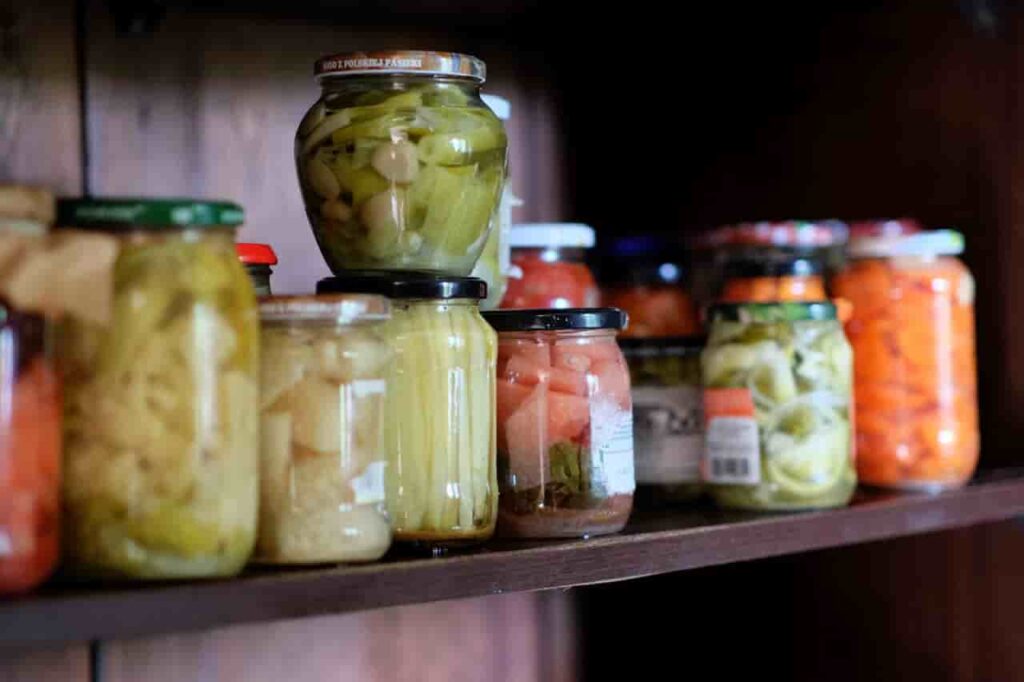
Storing organic baby food in glass jars
Conclusion
Choosing organic baby food has many advantages and can have a beneficial impact on your baby’s health. It offers a diet high in nutrients and devoid of potentially dangerous toxins present in foods grown conventionally.
Again, it is an eco-friendly option for parents and caregivers who wish to lessen their carbon footprint because it is composed of components that are developed in an environmentally responsible manner.
When selecting the food, check the ingredient list and search for organic certification to make sure you are getting the finest option for your baby. If you want to feed your infant fresh, wholesome meals and have complete control over the ingredients, think about going homemade.
By opting for organic baby food, you are providing your baby with the finest foundation in life and establishing good eating habits at a young age.
References
1. Liu Y, Sam AG. The organic premium of baby food based on market segments. Agribusiness. 2022 Jul;38(3):533-56.
